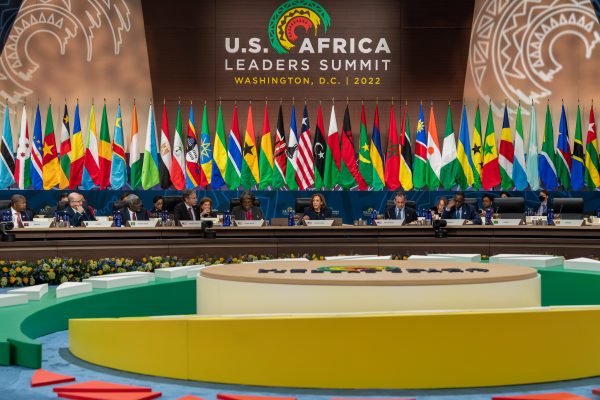
While President Joe Biden’s remarks at the recent U.S.-Africa Leaders Summit made no explicit reference to China, the summit’s outcomes solidify one thing: the Biden administration sees technology investment and development vis-a-vis China as a zero-sum game that the U.S. cannot lose.
Whereas past summits focused on key regional challenges, including food security and public health, this year, technology dominated the conversation. Specifically, Biden’s announcement of several tech-related initiatives signals America’s intent to counter China’s activity in Africa.
This is particularly true with Chinese telecommunications company Huawei, which illuminates China’s outsized influence in Africa’s technology ecosystem. Huawei has claimed independence from the Chinese Communist Party, but Chinese data regulations ultimately subject the company to government control.
Despite accusations of engaging in surveillance operations, maintaining insecure networks, and mishandling data, Huawei currently constitutes approximately 70 percent of Africa’s 4G infrastructure. In November 2022, Huawei announced plans to increase investment in Africa “to support the steady development of 5G to facilitate digital transformation in the region.”
China’s ties to African nations are well-documented, which may be due in part to its strong diplomatic presence. Chinese foreign ministers have made Africa the destination of their first overseas visit every year since 1991. Comparatively, no U.S. president has visited the continent since 2015.
In August 2019, the Wall Street Journal reported that Huawei helped the Ugandan government track the activities of opposition leader Robert Kyagulanyi. Likewise, unspecified officials in Zambia stated that Huawei helped the government access the phones and Facebook pages of individuals operating an opposition news site critical of then-President Edgar Lungu. In Burundi, South Africa, Senegal, and Egypt, Huawei has censored content and restricted access to political and social advocacy websites.
Multiple African countries also participate in Huawei’s “Safe City” initiative under which Huawei provides facial and license-plate recognition, social media monitoring, and other surveillance capabilities for alleged crime reduction purposes. Non-governmental and watchdog organizations have accused the initiative of advancing authoritarianism in several countries, including Serbia and Myanmar. African nations are similarly involved in Huawei’s “Seeds for the Future” program, which facilitates exchange programs in China for students interested in information and communications technology.
Huawei’s entrenchment and China’s broader influence in the African technology ecosystem should alarm the West for several reasons: It affords China an opportunity to set standards on the use of emerging technologies; threatens to expand authoritarian governance norms and surveillance systems; and limits the ability of the U.S. government to partner with and U.S. companies to invest in potentially compromised African countries.
The U.S.-Africa Leaders Summit’s focus on technology is thus a laudable first step toward rekindling U.S.-Africa relations and reducing these vulnerabilities. As Biden gears up for his visit to the continent, he must be prepared to accelerate this momentum for technology cooperation by using concerns about Huawei as a starting point.
First, Biden should proactively ensure congressional funding for Digital Transformation with Africa (DTA), a project he launched at the Leaders Summit. Many African nations partner with Huawei because its equipment and services are cheap and readily available, and the company has experience operating in remote areas. Through various initiatives led by U.S. government agencies and industry partners, DTA weakens Huawei’s appeal by offering trusted alternatives that bolster Africa’s digital infrastructure, expand digital access and literacy, and promote technological innovation.
But amid the lingering effects of the COVID-19 pandemic and a myriad of other domestic and global challenges, Congress may lack an incentive to devote resources toward DTA. The onus falls on the Biden administration to place DTA within the context of the China challenge, which has received heightened congressional attention and bipartisan support.
Second, the White House must designate an oversight body to monitor DTA’s implementation. Unlike past outcomes of the U.S.-Africa Leaders Summit, DTA involves a roster of disparate projects rather than one broad initiative. It also involves a host of both government agencies and industry organizations. Accountability mechanisms and strong public-private cooperation will be critical to DTA’s success.
Third, Biden should arrange meetings with technology leaders to demonstrate his commitment to tech cooperation and diplomacy. Togolese Minister of Digital Economy and Transformation Cina Lawson and South African Minister of Communications and Digital Technologies Khumbudzo Phophi Silence Ntshavheni are two examples.
Biden should also meet with local tech-focused organizations, such as Future Africa, Coding for Employment, and TechSoup Africa. Communicating with African technology experts like these would enable Biden to raise U.S. concerns about Huawei, survey bottlenecks to tech innovation and implementation, and identify opportunities for greater U.S. involvement in the African technology sector.
To effectively mitigate the influence of Huawei and other Chinese tech giants in Africa, the U.S. must position itself as a willing and reliable alternative partner. A renewed focus on Africa creates an opportunity for Biden to reinforce the U.S.’s technological edge and global leadership position, and to collaborate on advancing trusted telecommunications infrastructure.
Countering China in Africa by Reaffirming US Tech Leadership
Source: Frappler

0 Comments